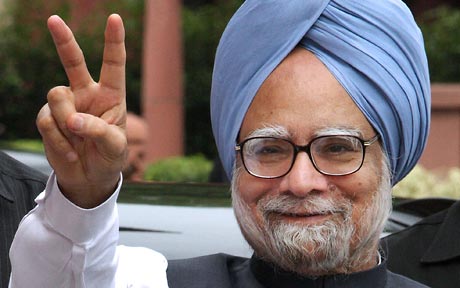There have been practically no market reforms since 2004, save for the opening of domestic civil aviation. Nothing has moved on privatisation, the reduction of government equity in banks and insurance companies, pensions, competition regulation and the administration of subsidies. Industrial tariffs have come down (as they were doing gradually pre-2004), but otherwise external protection has not been reduced. Indeed, export restrictions were slapped on in response to food inflation in 2008. India remains the most protectionist large emerging market.
Worse, there has been reform backsliding and reversal. Fiscal restraint, put in place by the Fiscal Responsibility and Budget Management Act of 2003, has been thrown to the winds. Now, with an economic downturn, the consolidated government deficit is projected to rise above 10 per cent. This is going to make private capital scarcer and more expensive. Funding for much-needed infrastructure projects will suffer. Administered pricing for petroleum products was reintroduced in 2008. Off-budget expenditure has increased significantly, especially through gimmicky, populist measures to support agriculture and rural employment, and to subsidise the state-owned energy sector when oil prices soared.
The government’s response to the present global economic crisis was to introduce further market-distorting restrictions, including higher tariffs, anti-dumping duties and assorted non-tariff barriers to imports. And it is even more resistant to opening up the financial sector to competition. The result will be to entrench the power of inefficient state-owned banks and insurers, and cramp incentives to save and invest in the private sector. Finally, the Congress Party entered the general election campaign with pledges to expand its hugely wasteful rural employment guarantee programme and increase food subsidies.
This is an abysmal record. The government has squandered the boom years, left the country extra-vulnerable to malign global economic conditions, and compromised prospects for a healthy recovery. But Manmohan Singh and his ‘dream team’ have been given an easy ride: they have escaped blame, especially in the eyes of the international commentariat. The conventional excuse is that their hands are tied by Sonia Gandhi and her Congress coterie, and by messy coalition politics.
This explanation just does not wash. Dr. Singh has impeccable academic credentials and is by all accounts incorruptible. He deserves credit for his performance as finance minister in the early and mid 1990s – though at least as much credit should go to the then prime minister, Narasimha Rao, who had to take the tough decisions. But Dr. Singh has proved a hopeless decision-maker as prime minister. He has had the academic’s and bureaucrat’s reflex action to set up one worthy commission after another, whose worthy reports have duly gathered dust on government shelves. But he has lacked the political instinct and moral courage to take tough decisions, hiding behind the fig-leaf of Mrs. Gandhi and the troublesome Left parties that propped up the government. The latter withdrew their support in mid-2008, and the government won a vote of no-confidence, yet – surprise, surprise — market reforms did not materialise. Sadly, Dr. Singh proves the rule that academics should generally be ‘on tap’ but not ‘on top’.
The whole reform programme depends crucially on the prime minister himself. Narasimha Rao and A.B. Vajpayee proved their mettle, despite heavy political constraints. Dr. Singh has failed; he should bear much of the blame. That blame must also be shared with the other sweet-talking, weathervane-members of his dream team. The Congress party does not deserve to be re-elected, and the dream team does not deserve to continue in office. The question is whether an alternative BJP-led government would do any better.
Nevertheless, the failure of the Congress-led government should be put into a larger institutional context. The Indian state, led by a neanderthalic and venal political-bureaucratic elite, remains unreformed. Indeed, state institutions – the political class, political parties, parliaments, the bureaucracy, the judiciary –have got worse at both Union and state levels. Since the late 1980s, ‘stealth reforms’ have taken place outside the state. But India cannot be expected to grow and prosper far and fast, not just now but for decades ahead, with such shaky foundations. The upshot is that much-needed market reforms cannot continue to skirt round the reform of the state itself. Politically, that is the hardest nut to crack.
Razeen Sally is Director of the European Centre for International Political Economy in Brussels and on the faculty of the London School of Economics. A shorter version of this piece appeared in the Financial Times as Congress deserves to lose India’s elections. A longer version of this piece appeared on the European Centre for International Political Economy (ECIPE) blog at http://www.ecipe.org/blog/


There is little any political party can do. I would pin my hopes on a Congress re-election.